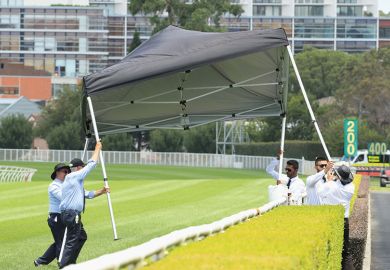We hear a lot these days about the “grand challenges” – how we, as a species, are going to solve the most pressing problems facing the world.
The received wisdom in higher education is that academics need to get out of their silos and start working with colleagues in different subject areas because these problems need to be attacked from multiple angles. How are we supposed to solve the grand challenges unless people collaborate?
But we hear the same refrain outside academia too. Why can’t businesses learn things from creative people? Why can’t creatives take a more evidence-based approach and embrace data? At the root of the problem is what you might call the professionalisation of knowledge.
In the 18th century, the arts and sciences were not compartmentalised. It was completely possible for someone like Erasmus Darwin, who lived for a time in my home city of Lichfield, to exist.
Darwin was many things: a doctor, engineer, botanist, abolitionist, poet. He improved the steering mechanisms on carriages with a design that used four jointed rods in the form of an isosceles trapezium (a similar concept was later applied to cars). He had radical ideas about religion and upset the clergy at Lichfield Cathedral by driving about in a carriage with the motto E conchis omnia (“Everything from shells”) painted on the side.
He also wrote long, epic poems about natural history; his ideas inspired his grandson, Charles Darwin, to come up with a completely new theory of evolution (“Everything from apes” you might call it).
Erasmus Darwin’s multiple interests were not unusual at the time. He was part of a vibrant group of Midlands thinkers, the Lunar Society, that included businessmen, inventors, doctors and philosophers. Between them they contributed to knowledge in diverse ways, including the discovery of the first heart medicine, the creation of the first British copper coinage, the isolation of oxygen and the invention of soda water.
How did they manage to work across so many disciplines? First, people defined their identities in different, more fluid, ways in the 18th century compared with today.
Crucially, the idea of defining oneself by a job was completely alien. Unless you were a doctor or a lawyer, the concept of a “profession” had not been invented, never mind the concept of advertising or marketing one’s skills or services. This is now normal and whole industries rest on bolstering one’s professional status, yet when it comes to the grand challenges it is making us less, not more, effective.
It is worth remembering that the idea of experts and expertise is not an 18th-century, but a 19th-century, phenomenon. An expert is defined as someone who is knowledgeable and skilful in a certain area, but we also think of experts as having knowledge that is inaccessible to the layman.
Expertise is a source of power, and traditionally, it has been in the interest of academic disciplines to develop their own distinctive methodologies and jargon that serve to repel unwanted aspirants and to elevate the status of the work and those doing it. The unintended downside is that disciplines, and thinking, have become compartmentalised.
Add to this what psychologists call the “similarity-attraction effect” – the idea that people gravitate towards people who are like them – and you have a problem. It is only natural to want to collaborate with people whose world view is the same as your own (“birds of a feather flock together”), but how useful is that in a problem-solving context? What you want, in fact, is someone with whom you have nothing in common and who sees things totally differently.
Helping academic disciplines to get rid of their filter bubble is now a hot topic because funding relies on it. Like the grand challenges themselves, it will not be solved quickly, but perhaps institutions need to change, not just the people within them.
We don’t need embarrassing Google-style running tracks or ball pits, but more shared spaces where diverse colleagues could meet. In the 1980s when my father worked in television, the studio had a canteen and it was here, over lunch, where all the cross-departmental collaboration happened. The universities of Oxford and Cambridge have long known this; the whole collegiate system is based on the notion of a community of diverse scholars who live and work together, and share ideas.
But people will not be encouraged to change their working styles unless there are significant benefits – or indeed, the consequences of failure are eradicated. Any research worth doing takes a long time, and the risk of new collaborations not bearing fruit is considerable if you have targets to meet, such as a slew of four-star outputs in the research excellence framework.
Perhaps it is no coincidence that the Lunar Men were also friends whose inventions were the product of leisure, large quantities of booze and enquiry for the sake of pleasure. As with canteens, enjoyment, not work, is perhaps the key to solving the grand challenges – a message that is unlikely to resonate well with employers.
Annette Rubery is communications manager at Aston University and in her spare time is an independent researcher in the field of 18th-century theatre.
Register to continue
Why register?
- Registration is free and only takes a moment
- Once registered, you can read 3 articles a month
- Sign up for our newsletter
Subscribe
Or subscribe for unlimited access to:
- Unlimited access to news, views, insights & reviews
- Digital editions
- Digital access to THE’s university and college rankings analysis
Already registered or a current subscriber?







